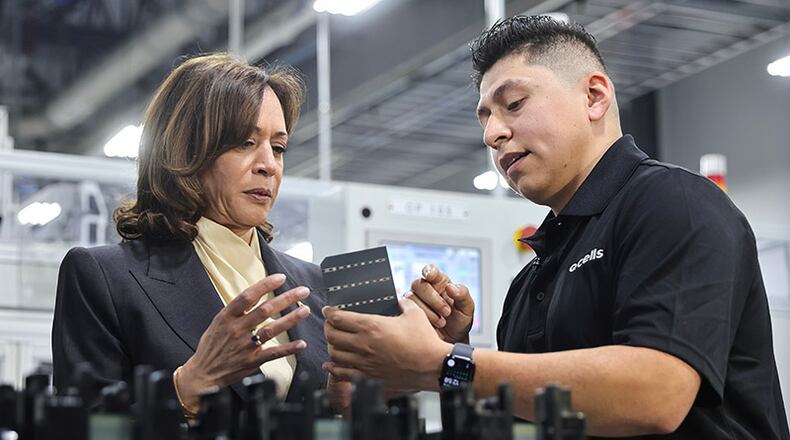Vice President Kamala Harris toured an expanding solar panel facility in northwest Georgia on Thursday, where she announced a historic order for millions of Georgia-built panels and credited federal policies for new clean energy jobs.
The visit is part of President Joe Biden’s “Investing in America” tour — a precursor to a likely 2024 re-election campaign — where Biden and Harris are highlighting green technology facilities across the county to tout their legislative agenda in blue-collar communities.
Here are five things to know about Harris’ visit, the solar panel order and the politics at play:
1. Largest community solar purchase in U.S. history
Harris announced Qcells, a South Korean-based solar panel company with a manufacturing facility in Whitfield County, received an order for 2.5 million panels as part of a massive community solar project.
Qcells and Virginia-based Summit Ridge Energy committed to deploying 1.2 gigawatts of community solar power, which generate enough electricity to power 140,000 homes and businesses. It currently takes Qcells’ Georgia facility roughly eight months to build the solar panels required to fulfill that amount of energy.
Harris called it the largest commitment of its type in U.S. history.
2. Expanding access to solar energy
Community solar projects focus on apartment buildings, clusters of businesses and other structures shared by groups.
Residents, businesses or other groups pool resources to deploy and connect to solar arrays built in other locations, allowing them to buy or lease access to the installations. There are several such arrangements in Georgia. Harris said these projects, on average, will result in 10% lower energy costs for participants.
White House officials said they expect the solar panels to be spread among 350 communities across the country. The specific projects that will receive the Peach State-built panels are still being determined, but the initial projects will be in Illinois, Maryland and Maine.
Credit: Natrice Miller / Natrice.Miller@ajc.com
Credit: Natrice Miller / Natrice.Miller@ajc.com
3. Historic expansion of clean energy manufacturing
Qcells opened its solar panel facility near Dalton in 2019, and it’s now the largest factory of its type in the Western Hemisphere. But it’s about to get larger — and gain an even bigger sister facility in metro Atlanta.
Qcells announced a $2.5 billion expansion in January, which the company and elected officials called the largest ever investment in American clean energy manufacturing. The company is expanding its current facility’s capacity to 3.1 gigawatts while also building a new 3.3-gigawatt plant near Cartersville.
The new production at both facilities is expected to be online by 2024 and bring 2,500 jobs to the state.
Credit: Natrice Miller/AJC
Credit: Natrice Miller/AJC
4. Green jobs in a deep-red part of Georgia
The vice president’s visit highlights Georgia’s battleground status. Dalton, famous for its flooring and carpet industries, is in a deep-red corner of Georgia, a bastion of former President Donald Trump and the home district of conservative firebrand U.S. Rep. Marjorie Taylor Greene.
When Harris’ motorcade arrived Thursday, Greene supporters lined the streets to wave signs saying, “Trump won.” White House officials focused on the irony of clean energy facilities creating jobs in areas where local representatives have been critical of efforts to combat climate change and ween the nation off fossil fuels. Greene, along with every Republican in Congress, voted against the Inflation Reduction Act, the Democrats’ signature climate and health bill, which includes huge incentives for green energy projects.
Qcells is not alone in basing its operations in conservative leaning areas. Electric vehicle startup Rivian plans to build a $5 billion factory in Morgan and Walton counties; Hyundai Motor Group is currently building a $5.54 billion EV plant in Bryan County; and Qcells’ forthcoming new facility will be in Bartow County, near Cartersville. Though Biden narrowly won Georgia in the last presidential election, Trump handily won each of those counties in 2020.
Credit: Ben Gray
Credit: Ben Gray
5. Layered incentives for clean tech investment
Georgia has emerged as a national leader in clean tech manufacturing, boosted by federal climate-focused incentives and state and local inducements.
Georgia’s top Republicans and Democrats have both claimed credit for the surge of new green jobs. Qcells has credited the the Democrats’ health and climate bill with making the expansion possible, while also thanking Republican Gov. Brian Kemp’s office for lucrative tax incentives and workforce programs.
“You (Harris) and the president have seized on the opportunity for clean energy to revitalize American manufacturing,” DK Kim, vice chairman of Qcells parent company Hanwha, said Thursday. “We also couldn’t have opened these factories without the support of Georgia Gov. Brian Kemp and communities like Dalton.”
Kemp said the Biden-Harris Administration is trying to take undue credit for the state policies that prompted Qcells to come to Georgia.
“Qcells has been a a valued partner for the Peach State as we’ve experienced booming growth in next-gen jobs since they first opened in 2019, way before politicians in Washington started taking credit for it,” he said in a statement.
About the Author






